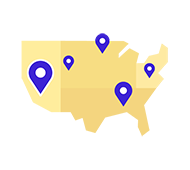
Find the right small business insurance for your company



What is small business insurance?
Small business insurance is exactly what it sounds like: insurance designed for small businesses like yours. You might need insurance to comply with state laws, rent an office, or sign a contract with a client.
Some policies help your business recover from fires and storms, others help pay for lawsuits brought by customers or employees. You can get coverage for auto accidents, theft, data breaches, and other specific risks.
Even when it’s not required, it’s a good idea to carry coverage. Otherwise, the high costs of legal expenses and medical bills can easily overwhelm a small business.
Top small business insurance policies
General liability insurance
A general liability policy covers common business risks including bodily injuries, customer property damage, and advertising injuries. It's required for most commercial leases.
- Slip-and-fall accidents
- Damaged customer property
- Libel and slander lawsuits
Business owner's policy
A BOP bundles commercial property coverage and general liability coverage in one plan. It's one of the most cost-effective commercial insurance policies.
- Customer injuries
- Accidental damage to customer property
- Business interruption incidents
Workers’ compensation insurance
Workers' comp is required in almost every state for businesses with employees. It also protects sole proprietors against work-related injury costs that health insurance might deny.
- Employee medical expenses
- Disability benefits
- Workplace injury lawsuits
Commercial auto insurance
Most states require this coverage for business-owned vehicles. It helps cover legal costs in the event of an accident, along with vehicle theft and vandalism.
- Car accidents
- Vandalism and theft
- Weather damage
Professional liability insurance
This policy can help cover legal expenses if a business is sued for professional negligence. It's also called errors and omissions insurance (E&O).
- Mistakes and oversights
- Undelivered work or services
- Advice that causes financial loss
Commercial property insurance
A commercial property policy covers the value of a business's physical structure and its contents, such as inventory, equipment, and furniture.
- Fire
- Vandalism and theft
- Windstorms
Errors and omissions insurance
E&O, sometimes called professional liability insurance, is common with professional services. It can cover legal costs related to your work performance.
- Missed deadlines
- Errors in calculations
- Misrepresentation
Cyber insurance
This type of coverage helps businesses recover financially from data breaches and cyberattacks. It's strongly recommended for any business that handles customer information.
- Data breach investigations
- Customer notification expenses
- Fraud monitoring services
Commercial umbrella insurance
Umbrella insurance provides additional coverage once another policy's limit is reached. It boosts coverage on your existing general liability insurance and other liability policies.
- Accidents that injure customers
- Multi-vehicle auto accidents
- Negligence in workplace safety

How much does small business insurance cost?

Small businesses, especially low-risk ones, often qualify for discounted business insurance. Here are the average costs for top policies sold by Insureon:
General liability insurance: $42 per month
Professional liability: $61 per month
Workers' comp: $45 per month
Several factors affect policy costs, including:
- Industry and risk factors
- Business operations
- Location
- Number of employees
- Policy limits and deductibles
- Claims history
Verified business insurance reviews
Hear from customers like you who purchased small business insurance.
How do I get small business insurance?
Insureon is the #1 digital business insurance agency. Our streamlined process helps you find coverage for your specific risks at an affordable rate.
Get insurance for your small business today in three easy steps:
- Fill out our free application.
- Compare custom quotes from trusted carriers.
- Choose a policy and pay online.
Insureon's application asks for basic facts about your company, such as revenue and number of employees. After you complete it, you'll receive quotes from top-rated carriers for policies that fit your business.
Our insurance partners include The Hartford, Liberty Mutual, Nationwide, Philadelphia Insurance, and more. You won't see quotes from all providers, only those that are the best match for your business.
Product liability insurance
Medical malpractice insurance
Tools and equipment insurance
Builder's risk insurance
Liquor liability insurance
Business interruption insurance
Management liability insurance
FAQs about small business insurance
Review answers to frequently asked questions about small business insurance coverage.
What does small business insurance cover?
No single insurance policy covers everything. In general, there are two broad areas of insurance coverage:
- Business liability insurance covers incidents in which someone holds your business accountable for an injury, property damage, or financial loss. It pays for legal defense costs, such as attorney's fees, court costs, judgments, and settlements.
- Commercial property insurance helps pay for theft and damaged business property, including your building if you own it. That includes damage from fires, storms, and vandalism.
A business owner's policy is a good place to start if you're unsure of which coverage you need. It includes both general liability insurance and property insurance at a discount, and protects against the most common lawsuits and damages.
Keep in mind that your homeowner's insurance, health insurance, and personal auto insurance will provide little to no coverage for business-related incidents. Learn more about small business insurance coverage and which policies are right for you.
Why do I need business insurance?
Business insurance, also called commercial insurance, provides crucial protection for any small business owner. Here are the top reasons why you might need coverage:
- Lawsuits are expensive. If there’s an accident at your business, you could face a lawsuit. The high cost of litigation, medical bills, and property damage claims are the primary reasons businesses need insurance.
- Your state requires insurance. Almost every state requires businesses to carry workers' compensation insurance when they have employees, and commercial auto insurance for company-owned vehicles.
- You need to sign a lease, loan, or contract. Landlords, lenders, and clients all prefer to work with insured businesses. In many instances, they'll ask you to provide proof of insurance before you can rent an office, take out a business loan, or sign a contract.
- You need a license. Depending on your profession, your state might require you to get a license. Plumbers, electricians, and other contractors often need to carry general liability insurance to get licensed, while real estate agents often need errors and omissions insurance.
Learn more about why businesses need insurance.
How does business structure affect what kind of insurance I need?
Every business needs insurance, but the type of business can affect which policies you need. Small businesses have fewer resources to recover from costly lawsuits and accidents, which makes insurance a crucial part of risk management.
Here are a few examples of how business structure can impact the policies you need:
- Businesses that have a board of directors need D&O insurance. Directors and officers insurance protects board members from litigation costs related to their business decisions.
- Sole proprietors that drive their own car for work may need HNOA insurance. Hired and non-owned auto insurance covers legal costs if you get into an accident in a personal, leased, or rented vehicle used for business purposes.
- Independent contractors might need a certificate of insurance. Clients often require contractors to provide proof of insurance for general liability, workers' comp, or other policies to ensure they're protected in the event of a lawsuit or incident.
Read more about insurance for your type of business:
Does my company need a business bond?
Many small businesses are both bonded and insured. This means they have bought a bond, in addition to carrying insurance. A bond acts as a financial guarantee that your business will complete a project as promised.
You might need a bond to sign a contract, bid on a project, or get a license. Here are the most common types of bonds:
- Surety bonds are a general category of bonds that guarantee your business will fulfill the terms of a contract.
- Fidelity bonds are a specific type of surety bond that provides reimbursement for clients in the event of employee theft or fraud.
- License and permit bonds refers to bonds you need for a license or a permit, such as a contractor's license or a permit for pesticide application.
- Janitorial bonds are bonds that guarantee reimbursement in the event of theft by employees of a cleaning company.
- Construction bonds refers to a range of bonds used in the construction industry, such as bid bonds, performance bonds, and payment bonds.
If your business fails to meet the terms of a contract, a bond will reimburse the client for their financial loss. Unlike an insurance claim, your business must then pay this amount back to the company that issued the bond.

Can Insureon help me find small business insurance in my state?
Because coverage varies by state, it's important to have a knowledgeable agent. Our insurance agents are licensed in 50 states and Washington, D.C., and can help you comply with local requirements.
Here are several insurance products that you might need to comply with the laws in your state:
- Workers' compensation insurance is required in most states as soon as you hire your first employee. Only Texas and South Dakota don't mandate coverage.
- Commercial auto insurance is required for business-owned vehicles in every state except for New Hampshire.
- Professional liability insurance, also called errors and omissions insurance (E&O), is sometimes required for real estate agents, insurance agents, lawyers, and other professionals.
- Medical malpractice insurance is a type of professional liability insurance that's often required for doctors with admitting privileges.
- General liability insurance is often a licensing requirement for general contractors and other specialty trades. For example, all general contractors in California need this coverage.
If you need help finding insurance and you're not sure of the laws in your state, contact an agent. They can help make sure you get the right policies and the amount of coverage you need.
Explore your state's insurance requirements

How do I make a business insurance claim?
Policyholders should notify their insurer as soon as an incident occurs. To make a property or liability claim, simply call your insurance provider.
An agent will ask for a description of the incident and basic information such as your business's name and policy number. They will guide you through the process, answer your questions, and send the necessary paperwork.
Read more about how to make a general liability claim.
Where can I learn more about small business insurance coverage options?
You can find more information in our frequently asked questions about small business insurance.
If there are any additional questions you have about coverage, you can also contact a licensed agent. We can help you find the right coverage, discuss the types of insurance you need, and compare business insurance quotes, with underwriting from the nation’s top carriers. You can secure coverage and your certificate of insurance within 48 hours.











